IN NOVEMBER, 2019, Bolivia’s three-term left-wing President, Evo Morales, was forced by the country’s military and police forces to flee to Mexico after Morales, the prior month, had been officially certified as the winner of his fourth consecutive presidential election. It was unsurprising that Morales won. As the Associated Press noted in 2014, his governance was successful by almost every key metric, and he was thus “widely popular at home for a pragmatic economic stewardship that spread Bolivia’s natural gas and mineral wealth among the masses.”
While Morales’ popularity had marginally waned since his 2014 landslide victory, he was still the most popular politician in the country. On the night of the October 21, 2019, vote, Bolivia’s election board certified that Morales’ margin of victory against the second-place candidate exceeded the ten percent threshold required under Bolivian law to avoid a run-off, thus earning him a fourth term. But allegations of election fraud were quickly voiced by Morales’ right-wing opponents, leading to his expulsion from the country on November 11.
Once he fled, Bolivia’s first-ever president from the country’s Indigenous population was replaced by a little-known, white, far-right senator, Jeanine Áñez, from the country’s minority European-descendent, Christian, wealthy region. Her new, unelected government promptly massacreddozens of Indigenous protesters and then vested the responsible soldiers with immunity. Seven months later, Áñez predictably continues to rule Bolivia as “interim President” despite never having run for President, let alone having been democratically elected.
The central tool used by both the Bolivian Right and their U.S. government allies to justify the invalidation of Morales’ 10-point election victory were two election audits by the regional group Organization of American States — one a preliminary report issued on November 10, the day before Moraels was forced from the country, and then its final report issued the next month — which asserted widespread, deliberate election fraud.
“Given all the irregularities observed, it is impossible to guarantee the integrity of the data and certify the accuracy of the results,” the OAS announced on November 10 as the country was in turmoil over the election. The next day, Morales, under the threat of force to him and his family, boarded a plane to Mexico, where he was granted asylum. The final OAS report in December claimed that “the audit team has detected willful manipulation” of the results based on “incontrovertible evidence of an electoral process marred by grave irregularities.”
But on Sunday, the New York Times published an article strongly suggesting that it was the OAS audit, not the Bolivian election, that was “marred by grave irregularities,” making it “impossible to guarantee the integrity of the data and certify the accuracy of the” OAS’ claims. The paper of record summarized its reporting this way: “A close look at Bolivian election data suggests an initial analysis by the OAS that raised questions of vote-rigging — and helped force out a president — was flawed.”
To cast serious doubt on the integrity of these critical OAS reports, the Times’ relies upon a new independent study from three scholars at U.S. universities which — in the words of the NYT — examined “data obtained by The New York Times from the Bolivian electoral authorities.” That study, said the NYT, “has found that the Organization of American States’ statistical analysis was itself flawed.”
That study documented that the key “irregularity” cited by OAS “was actually an artifact of the analysts’ error.” It further explained that with regard to “the patterns that the observers deemed ‘inexplicable,’” the new data analysis shows that “we can explain them without invoking fraud.”
While this new study focuses solely on the OAS’s data claims and does not purport to decree the Bolivian election entirely free of fraud — virtually no election, including in the U.S., is entirely free of irregularities — the NYT explains that “the authors of the new study said they were unable to replicate the OAS’s findings using its likely techniques” and that “the difference is significant” in assessing the overall validity of the OAS’s claims.
”In sum,” the new report concludes, “we offer a different interpretation of the quantitative evidence that led the OAS and other researchers to question the integrity of the Bolivian election.“ Specifically, “we find that we do not require fraud in order to explain the quantitative patterns used to help indict Evo Morales.” The scholars’ bottom line: “we cannot replicate the OAS results.”
IT IS VIRTUALLY IMPOSSIBLE to overstate the importance of the OAS accusations in driving Morales from his own country and, with no democratic mandate, shifting power in lithium-rich Boliviato the white, Christian, U.S.-subservient Right. While critics had also accused Morales of improperly seeking a fourth term despite constitutional term limits, Bolivia’s duly constituted court had invalidated those term limits (much the way that New York Mayor Michael Bloomberg induced the City Council to overturn a term limit referendum so he could seek a third term), leaving anti-Morales outside agitators, such as the OAS and U.S. officials, to rely instead on claims of election fraud.
On the day the preliminary OAS report was released, U.S. Secretary of State Mike Pompeo cited it both on Twitter and on the official State Department website to demand new elections:
Fully support the findings of the @OAS_official report recommending new elections in #Bolivia to ensure a truly democratic process representative of the people’s will. The credibility of the electoral system must be restored.
2,040 people are talking about this
Pompeo, in January of this year, visited OAS’ Washington office and heaped praise on the organization for the role its audit played in forcing Morales from the country — a move which Pompeo heralded by invoking the long Orwellian U.S. tradition of depicting pro-U.S. military coups as “pro-democracy”:
More recently, the OAS honored the former Bolivian government’s request to conduct an audit of the disputed election results. The probe conducted uncovered proof of massive and systemic fraud. It helped end the violence that had broken out over the election dispute. It helped the Bolivian Congress unanimously establish a date and conditions for a new election. And it honored – importantly, it honored the Bolivian people’s courageous demand for a free and fair election, and for democracy.
U.S. media outlets and foreign policy commentators dutifully echoed the U.S. State Department’s line, as they typically do, by depicting the violent military coup as an advancement of freedom and democracy for the Bolivian People (the same Bolivian People who had just voted for Morales to be their President). As a Washington Post op-ed in February by two MIT scholars noted: “The media has largely reported the allegations of fraud [from the OAS] as fact.”
Two days before Morales was forced to flee Bolivia, Johns Hopkins Professor Yascha Mounk, who also covers foreign policy for The Atlantic, praised the coup leaders as “bravely standing up for democracy against a wannabe dictator,” and then, the following day, cited the preliminary OAS study as proof that the election was fraudulent:
The Bolivian people are bravely standing up for democracy against a wannabe dictator, and the world is paying virtually no attention.
[Short thread.]
1,531 people are talking about this
Wonderful news:
Election monitors from the Organization of American States found that there were "clear manipulations" of the voting results, calling for new elections.
It looks as though Evo Morales has reluctantly agreed to them.
El Pueblo Unido...bbc.com/news/world-lat…
55 people are talking about this
No, Evo Morales' resignation is not a coup; it is one of the few big victories democracy has won in recent years.
Both leftist dictators, like Venezuela's Maduro, and far-right populists, like Hungary’s Orbán, should be terrified by it.
Me @TheAtlantic.theatlantic.com/ideas/archive/…
4,744 people are talking about this
On November 11, the day after Morales was forced to flee, Mounk wrote in The Atlantic that Morales got what he deserved, claiming, among other things, that he rigged the election: “The strong circumstantial evidence of vote tampering succeeded in inspiring what years of more subtle attacks on democratic institutions had failed to do: Millions of Bolivians went out into the streets to demand a fair election.” One point Mounk got right: the OAS report was decisive. “When an independent observer mission from the Organization of American States published its audit of the election yesterday, the game was finally up,” he wrote.
(Mounk, knowing that there are never consequences for serving as a puppet for U.S foreign policy, has said not a word about the new study debunking the OAS claims).
Former Obama foreign policy official and current Stanford Professor Michael McFaul also cited the OAS report to cheer Morales’ fleeing as some sort of “excellent” blow for freedom and democracy, only subsequently to delete his tweet when it prompted criticism, acknowledging that he lacked the necessary information to form judgments:
I called Morales departure excellent, in line with OAS criticism of election. But then deleted the tweet after not wanting to come to judgement about the causes of his departure. Getting out of this Bolivia debate now; there's no space for rational discourse in it.
See Michael McFaul's other Tweets
The editor-in-chief of the ostensibly progressive journal Mother Jones, Clara Jeffery, had never previously evinced the slightest interest in or knowledge about Bolivia, yet somehow decided she was able to credibly snap into line behind the State Department by claiming that it was President Morales — rather than the coup plotters — who had “taken several end runs around a democratic process”:
Dicey times in Bolivia. Morales had taken several end runs around a democratic process but let’s hope it is a democratic process that succeeds him twitter.com/nytimes/status…
1,207 people are talking about this
It likely goes without saying that the reliably pro-western-coup magazine, The Economist, was also among those leading the way in echoing the U.S. State Department and cheering the coup as a victory for democracy. “The armed forces spoke up for democracy and the constitution against an attempt at dictatorship,” announced the magazine during the week Morales was forced into exile. The Economist also posted more than a dozen tweets during that week claiming it was Morales who posed the threat to Bolivian democracy by virtue of the OAS findings of fraud:
Evo Morales was a casualty of a counter-revolution aimed at defending democracy against electoral fraud and his own illegal candidacy econ.st/32Lt9Dz
710 people are talking about this
Evo Morales has resigned as Bolivia’s president, following election irregularities. @sarahmaslin tells “The Intelligence” that it’s not clear who is in charge now econ.st/2CydVY0
33 people are talking about this
But as usual, the two news outlets most influential in disseminating and ratifying false anti-democratic claims from the U.S. government were the Washington Post and — though they neglected to mention it in their article yesterday on the debunked OAS findings — the New York Times itself. The Post, in its article the day after Morales was forced to leave, ratified the election fraud accusation in its headline: “Bolivia’s Morales resigns amid scathing election report, rising protests.” The article heralded the findings of what it called “the multilateral organization,” noting that the OAS found Morales’ victory “was marred by profound irregularities.”
A Post editorial from the same day proclaimed in its headline: “Bolivia is in danger of slipping into anarchy. It’s Evo Morales’s fault.”
The Post editorial decreed: “there could be little doubt who was ultimately responsible for the chaos: newly resigned president Evo Morales.” How could the victim of a coup — who had just been elected President — be at fault for the resulting chaos? Because, explained the Post’s editors, “an audit released by the Organization of American States reported massive irregularities in the vote count and called for a fresh election.”
The New York Times similarly and repeatedly hyped the OAS report as proof that Morales’ victory was illegitimate and the coup therefore democratic. “An independent international audit of Bolivia’s disputed election concluded that former President Evo Morales’s officials resorted to lies, manipulation and forgery to ensure his victory,” its news article claimed, without a syllable of critical pushback until the penultimate paragraph, where it noted that “some economists and statisticians in the United States” had pointed to flaws in the OAS’ data analysis.
But the paper’s Editorial contained no such reservations, pronouncing Morales’ victory the by-product of “a flawed election,” noting that “early suspicions of fraud by the Organization of American States helped fuel the protests and provided cover for the military to ‘suggest’ that Mr. Morales leave office.” The Times’ Editorial then cited the final OAS report — which the paper yesterday called into question — as “substantiating those suspicions” by proving “‘a series of malicious operations aimed at altering the will expressed at the polls’ on Oct. 20.”
In sum, when it came to the 2019 Bolivian coup, the U.S. media played its decades-old, standard role whenever the U.S. wants to depict a military coup against a government it dislikes as a victory for democracy: namely, it blindly and dutifully adopted the State Department’s view and uncritically waved the flag.
As documented in his great, new book on the CIA’s Cold War tactics, “The Jakarta Method,” journalist Vincent Bevins — whom I recently interviewed for SYSTEM UPDATE — recounts how, throughout the Cold War, the U.S. media served as a key propaganda arm of the U.S. government by reliably depicting overthrows of adverse regimes as a joyous advancement for democracy. As but one example, Bevins described how the CIA prevailed on the New York Times to suppress reporting about the savagery of the agency-supported coup-plotters in Guatemala and instead glorify them as “rebels” who were nobly fighting for democracy:
Exactly the same formula was used by the New York Times and the bulk of the U.S. media when a U.S.-supported coup attempt in Venezuela failed in 2002 to depose the democratically elected President Hugo Chávez. In an extraordinary paragraph, the Times heralded the U.S.-favored coup-leaders in Caracas as the guardians and saviors of democracy, while the democratically elected President was somehow the “dictator”:
With yesterday’s resignation of President Hugo Chávez, Venezuelan democracy is no longer threatened by a would-be dictator. Mr. Chávez, a ruinous demagogue, stepped down after the military intervened and handed power to a respected business leader, Pedro Carmona.
The Times similarly lamented the dangers posed to Bolivian democracy back in 2014 as the result of Morales’ landslide victory at the polls. To the Times and the U.S. media at large, democracy is imperiled when a candidate disliked by the U.S. wins at the polls; conversely, democracy can be saved only when such elected leaders are overthrown and replaced by force with a U.S.-backed puppet.
The NYT Editors, while conceding in 2014 that “it is easy to see why many Bolivians would want to see Mr. Morales, the country’s first president with Indigenous roots, remain at the helm” — namely, “during his tenure, the economy of the country, one of the least developed in the hemisphere, grew at a healthy rate, the level of inequality shrank and the number of people living in poverty dropped significantly” — nonetheless insisted that Morales should be regarded as an enemy of democracy because “the pattern of prolonged terms in power is unhealthy for the region” [notably, the NYT would never suggest that Angela Merkel’s “prolonged term in power” as German chancellor (15 years and counting) or Benjamin Netanyahu’s 4-terms-and-counting-in-power as Israeli prime minister pose a similar threat to democracy. This is a “concern” reserved by the U.S. media only for Latin American leaders disliked by the U.S. State Department].
At the end of its 2014 editorial on Bolivia and Latin America, the Times inadvertently revealed the real reason it disliked these elected leaders. Concern for democracy is the pretext. The real reason it wants those elected leaders gone was revealed by this candid sentence: “This regional dynamic has been dismal for Washington’s influence in the region.”
As U.S. media coverage of last year’s coup in Bolivia demonstrates, little has changed since the Cold War when it comes to media fealty to the State Department and the CIA. Because the U.S. government preferred the right-wing coup-plotters to the left-wing Morales, the U.S. media deliberately inverted the entire narrative to describe the elected leader (Morales) as the tyrant and the violent military coup leaders as the saviors of democracy. And they peddled this false narrative only by relying heavily on an OAS report that even the NYT is now forced to admit was, at best, deeply flawed.
THAT THE OAS REPORT WAS DUBIOUS is not, contrary to the subtext of the NYT’s new article, something that was only recently discovered. That has been clear from ample evidence from the start — evidence that the jingoistic U.S. media rarely saw fit to mention.
Shortly after the preliminary OAS report was issued, the Center for Economic and Policy Research (CEPR), on November 8, issued its own report highlighting numerous flaws in what it called “unsubstantiated doubts cast upon the vote count by the OAS mission.” Explaining that OAS claims of election irregularities were made “without evidence,” the report detailed that “neither the OAS mission nor any other party has demonstrated that there were widespread or systematic irregularities in the elections of October 20, 2019.”
In March, the CEPR issued an even more comprehensive analysis, an 82-page report that concluded: “the OAS’s observation activities in Bolivia’s 2019 general elections are the latest example of a deeply problematic observation mission whose dishonest, biased, and unprofessional conduct has caused serious damage to the country’s democracy.” It added that “while the fraud narrative that the OAS helped promote contributed to Evo Morales, the country’s democratically elected president, fleeing the country,” the OAS Report “does not provide any evidence that those irregularities altered the outcome of the election, or were part of an actual attempt to do so.”
In February — with Morales now in exile in Argentina — the Washington Post published an op-ed by two scholars from MIT. They summarized their argument this way:
The media has largely reported the [OAS’s] allegations of fraud as fact. And many commentators have justified the coup as a response to electoral fraud by MAS-IPSP. However, as specialists in election integrity, we find that the statistical evidence does not support the claim of fraud in Bolivia’s October election.
In sum, the authors concluded, after setting forth their statistical findings in detail: “there is not any statistical evidence of fraud that we can find — the trends in the preliminary count, the lack of any big jump in support for Morales after the halt, and the size of Morales’s margin all appear legitimate. All in all, the OAS’s statistical analysis and conclusions would appear deeply flawed.”
That the OAS is a subservient tool of the U.S. State Department is something that is widely known in Latin America. Yet it is a claim that virtually never appears in mainstream accounts from U.S. news outlets, which — as they did here — treat the group as some sort of neutral, authoritative arbiter of political disputes.
Shortly after Morales was exiled from Bolivia and received asylum in Mexico, I traveled to Mexico City to interview him. I asked Morales about the OAS, and this is what he said:
All along, there was ample reason to seriously doubt, if not outright reject, the OAS accusations of election irregularities and voter fraud. As CEPR’s Jake Johnston said today in response to the New York Times article:
For those paying close attention to the 2019 election, there was never any doubt that the OAS’ claims of fraud were bogus. Just days after the election, a high-level official inside the OAS privately acknowledged to me that there had been no “inexplicable” change in the trend, yet the organization continued to repeat its false assertions for many months with little to no pushback or accountability.
Yet those reasons for doubting the OAS accusations were barely ever even mentioned, let alone vested with credibility, by the U.S. media or its leading foreign policy commentators. Instead, as the MIT scholars wrote in the Washington Post, “the media largely reported the allegations of fraud as fact.” That’s because whenever it comes to changing a foreign country’s government that is disliked by the U.S., the U.S. media reflexively sides with the U.S. State Department and ceases to report and instead engages in pro-government propaganda.
In this case, Bolivia lost its most successful president in its modern history, and is consequently now ruled by an unelected military junta, all cheered on by the U.S. and its media, relying on an OAS report which even the New York Times is now forced to acknowledge is, at best, deeply flawed. Thus did the U.S. government and its media, yet again, help destroy a thriving Latin American democracy.
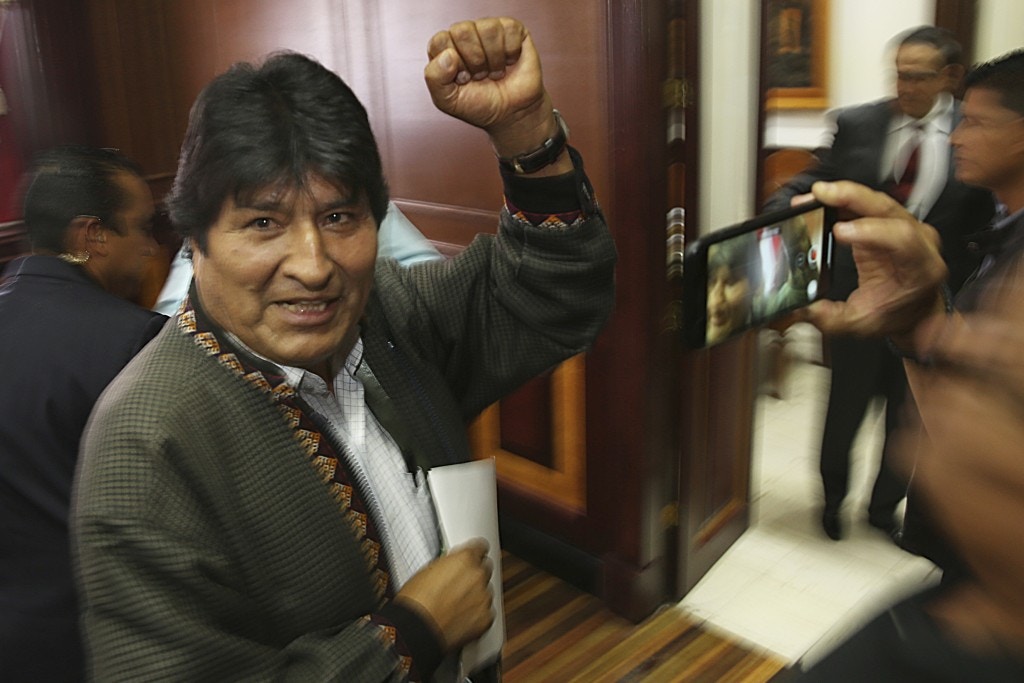
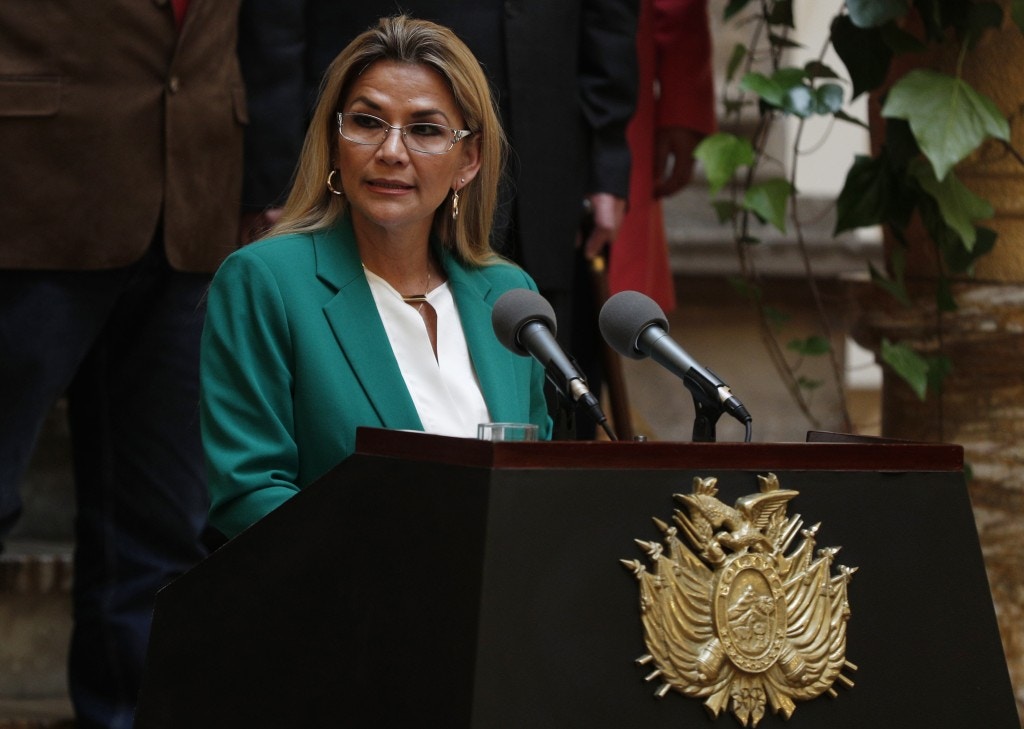












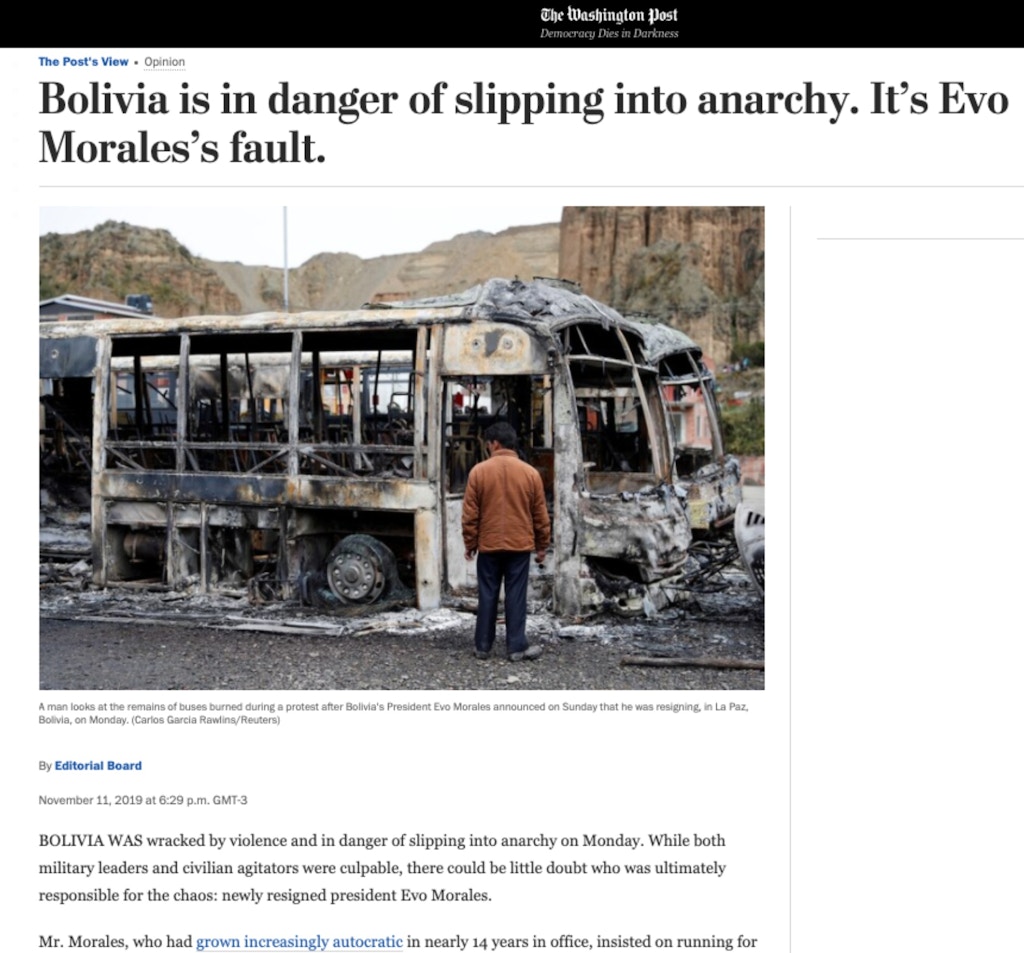
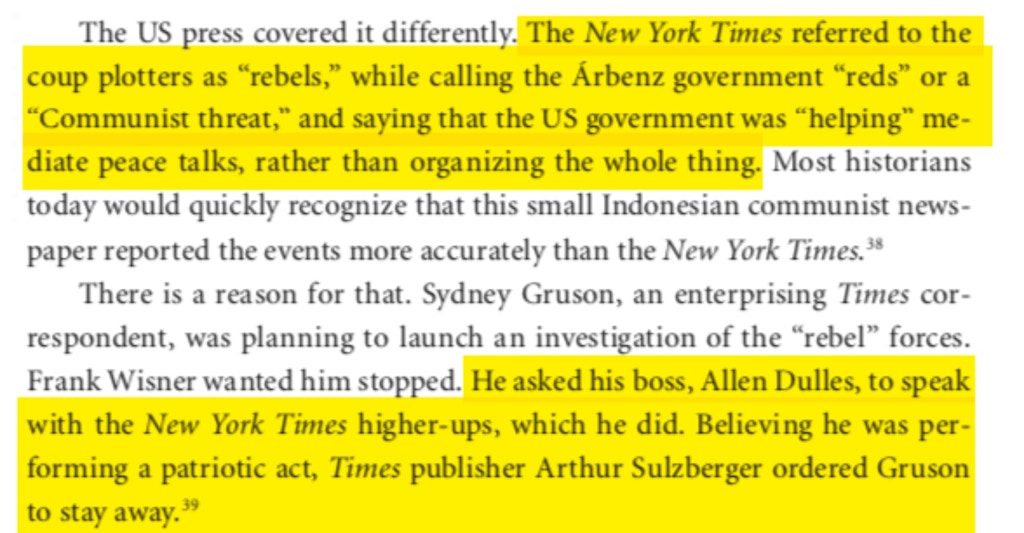
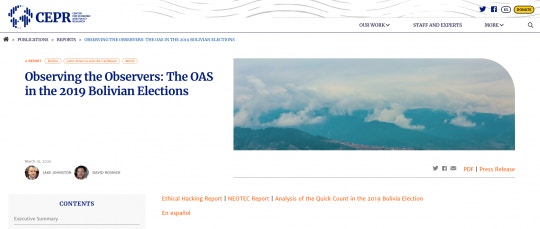




1 opmerking:
ze gaan je pakken ... https://www.human.nl/medialogica/lees/Stroomstootwapen-nieuws.html?fbclid=IwAR1vuW_7dXK_jK5hey6-fOfmWfdCltk6evzBD7zPDZEYXhkgDJf43xlH0Pk
Een reactie posten